"So live your life that the fear of death can never enter your heart.
Trouble no one about their religion;
respect others in their view, and demand that they respect yours.
Love
your life, perfect your life,
beautify all things in your life. Seek to make your life long and its
purpose in the service of your people.
Prepare a noble death song for the day when you go over the great
divide.
Always give a word or a sign
of salute when meeting or passing a friend, even a stranger, when in a
lonely place.
Show respect to all
people and grovel to none.
When you arise in the morning give thanks for
the food and for the joy of
living. If you see no reason for giving thanks, the fault lies only in
yourself.
Abuse no one and nothing, for
abuse turns the wise ones to fools and robs the spirit of its vision.
When it comes your time to die, be not
like those whose hearts are filled with the fear of death, so that when
their time comes they weep and
pray for a little more time to live their lives over again in a
different way. Sing your death song and die
like a hero going home."

"No tribe has the right to sell, even to each other, much less to
strangers.... Sell a country! Why not sell the air, the great sea, as well
as the earth? Didn't the Great Spirit make them all for the use of his
children?
The way, the only way to stop this evil is for the red man to unite in
claiming a common and equal right in the land, as it was first, and should
be now, for it was never divided."
We gave them forest-clad mountains and valleys full of game, and in return
what did they give our warriors and our women? Rum, trinkets, and a grave.
Brothers -- My people wish for peace; the red men all wish for peace; but
where the white people are, there is no peace for them, except it be on the
bosom of our mother. Where today are the Pequot?
Where today are the Narrangansett, the Mohican, the Pakanoket,
and many other once powerful tribes of our people?
They have vanished before the avarice and the oppression of the White Man,
as snow befor a summer sun."
Chief Tecumseh, Shawnee Nation

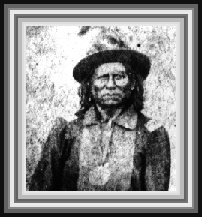
BROTHERHOOD
Brotherhood
All around sweet brotherhood
Be kind to one another
Brotherhood
No more us and them
Oneness
No more politics or denomination
Brotherhood
No more lust or greed
Peace and Life
No more war, violence, or unnecessary pain
Compassion
The Brotherhood will find joy
Dynaisium
Sweetness, Softness, Soulfulness
Tranquility, Serenity, Dignity
Harmony, Perfection
One Man, One Truth, One Life
SANTANA

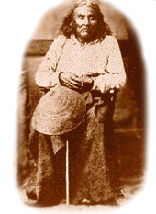
"CHIEF SEATTLE'S 1854 ORATION" - ver. 1
AUTHENTIC TEXT OF CHIEF SEATTLE'S TREATY ORATION 1854
Yonder sky that has wept tears of compassion upon my people for
centuries untold, and which to us appears changeless and eternal, may
change. Today is fair. Tomorrow it may be overcast with clouds. My words
are like the stars that never change. Whatever Seattle says, the great
chief at Washington can rely upon with as much certainty as he can upon the
return of the sun or the seasons. The white chief says that Big Chief at
Washington sends us greetings of friendship and goodwill. This is kind of
him for we know he has little need of our friendship in return. His people
are many. They are like the grass that covers vast prairies. My people are
few. They resemble the scattering trees of a storm-swept plain. The great,
and I presume -- good, White Chief sends us word that he wishes to buy our
land but is willing to allow us enough to live comfortably. This indeed
appears just, even generous, for the Red Man no longer has rights that he
need respect, and the offer may be wise, also, as we are no longer in need
of an extensive country.
There was a time when our people covered the land as the waves of
a wind-ruffled sea cover its shell-paved floor, but that time long since
passed away with the greatness of tribes that are now but a mournful
memory. I will not dwell on, nor mourn over, our untimely decay, nor
reproach my paleface brothers with hastening it, as we too may have been
somewhat to blame.
Youth is impulsive. When our young men grow angry at some real or
imaginary wrong, and disfigure their faces with black paint, it denotes
that their hearts are black, and that they are often cruel and relentless,
and our old men and old women are unable to restrain them. Thus it has ever
been. Thus it was when the white man began to push our forefathers ever
westward. But let us hope that the hostilities between us may never return.
We would have everything to lose and nothing to gain. Revenge by young men
is considered gain, even at the cost of their own lives, but old men who
stay at home in times of war, and mothers who have sons to lose, know
better.
Our good father in Washington--for I presume he is now our father
as well as yours, since King George has moved his boundaries further
north--our great and good father, I say, sends us word that if we do as he
desires he will protect us. His brave warriors will be to us a bristling
wall of strength, and his wonderful ships of war will fill our harbors, so
that our ancient enemies far to the northward -- the Haidas and Tsimshians
-- will cease to frighten our women, children, and old men. Then in reality
he will be our father and we his children. But can that ever be? Your God
is not our God! Your God loves your people and hates mine! He folds his
strong protecting arms lovingly about the paleface and leads him by the
hand as a father leads an infant son. But, He has forsaken His Red
children, if they really are His. Our God, the Great Spirit, seems also to
have forsaken us. Your God makes your people wax stronger every day. Soon
they will fill all the land. Our people are ebbing away like a rapidly
receding tide that will never return. The white man's God cannot love our
people or He would protect them. They seem to be orphans who can look
nowhere for help. How then can we be brothers? How can your God become our
God and renew our prosperity and awaken in us dreams of returning
greatness? If we have a common Heavenly Father He must be partial, for He
came to His paleface children. We never saw Him. He gave you laws but had
no word for His red children whose teeming multitudes once filled this vast
continent as stars fill the firmament. No; we are two distinct races with
separate origins and separate destinies. There is little in common between
us.
To us the ashes of our ancestors are sacred and their resting
place is hallowed ground. You wander far from the graves of your ancestors
and seemingly without regret. Your religion was written upon tablets of
stone by the iron finger of your God so that you could not forget. The Red
Man could never comprehend or remember it. Our religion is the traditions
of our ancestors -- the dreams of our old men, given them in solemn hours
of the night by the Great Spirit; and the visions of our sachems, and is
written in the hearts of our people.
Your dead cease to love you and the land of their nativity as soon
as they pass the portals of the tomb and wander away beyond the stars. They
are soon forgotten and never return. Our dead never forget this beautiful
world that gave them being. They still love its verdant valleys, its
murmuring rivers, its magnificent mountains, sequestered vales and verdant
lined lakes and bays, and ever yearn in tender fond affection over the
lonely hearted living, and often return from the happy hunting ground to
visit, guide, console, and comfort them.
Day and night cannot dwell together. The Red Man has ever fled the
approach of the White Man, as the morning mist flees before the morning
sun. However, your proposition seems fair and I think that my people will
accept it and will retire to the reservation you offer them. Then we will
dwell apart in peace, for the words of the Great White Chief seem to be the
words of nature speaking to my people out of dense darkness.
It matters little where we pass the remnant of our days. They will
not be many. The Indian's night promises to be dark. Not a single star of
hope hovers above his horizon. Sad-voiced winds moan in the distance. Grim
fate seems to be on the Red Man's trail, and wherever he will hear the
approaching footsteps of his fell destroyer and prepare stolidly to meet
his doom, as does the wounded doe that hears the approaching footsteps of
the hunter.
A few more moons, a few more winters, and not one of the
descendants of the mighty hosts that once moved over this broad land or
lived in happy homes, protected by the Great Spirit, will remain to mourn
over the graves of a people once more powerful and hopeful than yours. But
why should I mourn at the untimely fate of my people? Tribe follows tribe,
and nation follows nation, like the waves of the sea. It is the order of
nature, and regret is useless. Your time of decay may be distant, but it
will surely come, for even the White Man whose God walked and talked with
him as friend to friend, cannot be exempt from the common destiny. We may
be brothers after all. We will see.
We will ponder your proposition and when we decide we will let you
know. But should we accept it, I here and now make this condition that we
will not be denied the privilege without molestation of visiting at any
time the tombs of our ancestors, friends, and children. Every part of this
soil is sacred in the estimation of my people. Every hillside, every
valley, every plain and grove, has been hallowed by some sad or happy event
in days long vanished. Even the rocks, which seem to be dumb and dead as
the swelter in the sun along the silent shore, thrill with memories of
stirring events connected with the lives of my people, and the very dust
upon which you now stand responds more lovingly to their footsteps than
yours, because it is rich with the blood of our ancestors, and our bare
feet are conscious of the sympathetic touch. Our departed braves, fond
mothers, glad, happy hearted maidens, and even the little children who
lived here and rejoiced here for a brief season, will love these somber
solitudes and at eventide they greet shadowy returning spirits. And when
the last Red Man shall have perished, and the memory of my tribe shall have
become a myth among the White Men, these shores will swarm with the
invisible dead of my tribe, and when your children's children think
themselves alone in the field, the store, the shop, upon the highway, or in
the silence of the pathless woods, they will not be alone. In all the earth
there is no place dedicated to solitude. At night when the streets of your
cities and villages are silent and you think them deserted, they will
throng with the returning hosts that once filled them and still love this
beautiful land. The White Man will never be alone.
Let him be just and deal kindly with my people, for the dead are
not powerless. Dead, did I say? There is no death, only a change of worlds.

WHAT IS MAN WITHOUT THE BEASTS?
IF ALL THE BEASTS WERE GONE,
MAN WOULD DIE FROM
A GREAT LONELINESS OF THE SPIRIT
FOR WHATEVER HAPPENS TO THE BEASTS
SOON HAPPENS TO MAN"
CHIEF SEATTLE

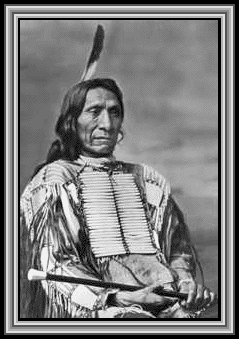
Red Cloud (Lakota) after Wounded Knee
There was not hope on earth, and God Seemed to have forgotten us. Some said
they saw the Son of God; others did not see Him. If He had come, He would
do some great things as He had done before. We doubted it because we had
seen neither Him nor His works. The people did not know; they did not care.
They snatched at the hope. They screamed like crazy men to Him for mercy.
They caught at the promise they heard He had made. The white men were
frightened and called for soldiers. We heard that soldiers were coming. We
did not fear. We hoped that we could tell them our troubles and get help. A
white man said the soldiers meant to kill us. We did not believe it."

"Friends," said Red Cloud, "it has been our misfortune to welcome the white
man. We have been deceived. He brought with him some shining things that
pleased our eyes; he brought weapons more effective than our own: above
all, he brought the spirit water that makes one forget for a time old age,
weakness, and sorrow. But I wish to say to you that if you would possess
these things for yourselves, you must begin anew and put away the wisdom of
your fathers. You must lay up food, and forget the hungry. When your house
is built, your storeroom filled, then look around for a neighbor whom you
can take at a disadvantage, and seize all that he has! Give away only what
you do not want; or rather, do not part with any of your possessions unless
in exchange for another's.
"My countrymen, shall the glittering trinkets of this rich man, his
deceitful drink that overcomes the mind, shall these things tempt us to
give up our homes, our hunting grounds, and the honorable teaching of our
old men? Shall we permit ourselves to be driven to and fro -- to be herded
like the cattle of the white man?" His next speech that has been remembered
was made in 1866, just before the attack on Fort Phil Kearny. The tension
of feeling against the invaders had now reached its height. There was no
dissenting voice in the council upon the Powder River, when it was decided
to oppose to the uttermost the evident purpose of the government. Red Cloud
was not altogether ignorant of the numerical strength and the
resourcefulness of the white man, but he was determined to face any odds
rather than submit.
"Hear ye, Dakotas!" he exclaimed. "When the Great Father at Washington sent
us his chief soldier [General Harney] to ask for a path through our hunting
grounds, a way for his iron road to the mountains and the western sea, we
were told that they wished merely to pass through our country, not to tarry
among us, but to seek for gold in the far west. Our old chiefs thought to
show their friendship and good will, when they allowed this dangerous snake
in our midst. They promised to protect the wayfarers.
"Yet before the ashes of the council fire are cold, the Great Father is
building his forts among us. You have heard the sound of the white
soldier's ax upon the Little Piney. His presence here is an insult and a
threat. It is an insult to the spirits of our ancestors. Are we then to
give up their sacred graves to be plowed for corn? Dakotas, I am for war!"
In less than a week after this speech, the Sioux advanced upon Fort Phil
Kearny, the new sentinel that had just taken her place upon the farthest
frontier, guarding the Oregon Trail. Every detail of the attack had been
planned with care, though not without heated discussion, and nearly every
well-known Sioux chief had agreed in striking the blow. The brilliant young
war leader, Crazy Horse, was appointed to lead the charge. His lieutenants
were Sword, Hump, and Dull Knife, with Little Chief of the Cheyennes, while
the older men acted as councilors. Their success was instantaneous. In less
than half an hour, they had cut down nearly a hundred men under Captain
Fetterman, whom they drew out of the fort by a ruse and then annihilated.
His private life was exemplary. He was faithful to one wife all his days,
and was a devoted father to his children. He was ambitious for his only
son, known as Jack Red Cloud, and much desired him to be a great warrior.
He started him on the warpath at the age of fifteen, not then realizing
that the days of Indian warfare were well-nigh at an end.
Among latter-day chiefs, Red Cloud was notable as a quiet man, simple and
direct in speech, courageous in action, an ardent lover of his country, and
possessed in a marked degree of the manly qualities characteristic of the
American Indian in his best days.

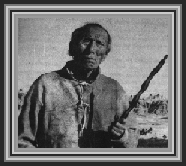
"Sometimes dreams are wiser than waking."

"I cured with the power that came through me. Of course, it was not I who
cured, it was the power from the Outer World, the visions and the
ceremonies had only made me like a hole through which the power could come
to the two-leggeds."
"If I thought that I was doing it myself, the hole would close up and no
power could come through. Then everything I could do would be foolish."
Black Elk: Holy Man of the Oglala Sioux, 1863-1950

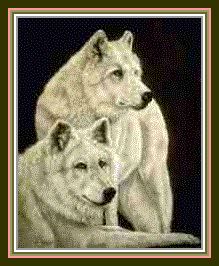
"WE SANG THE SONGS THAT CARRIED IN
THEIR MELODIES ALL THE SOUNDS OF
NATURE-THE RUNNING WATERS, THE SIGHING
OF THE WINDS, AND THE CALLS OF THE ANIMALS.
TEACH THESE TO YOUR CHILDREN
THAT THEY MAY COME TO LOVE NATURE
AS WE LOVE IT."
GRAND COUNCIL FIRE OF AMERICAN INDIANS

More Great Leaders
Home